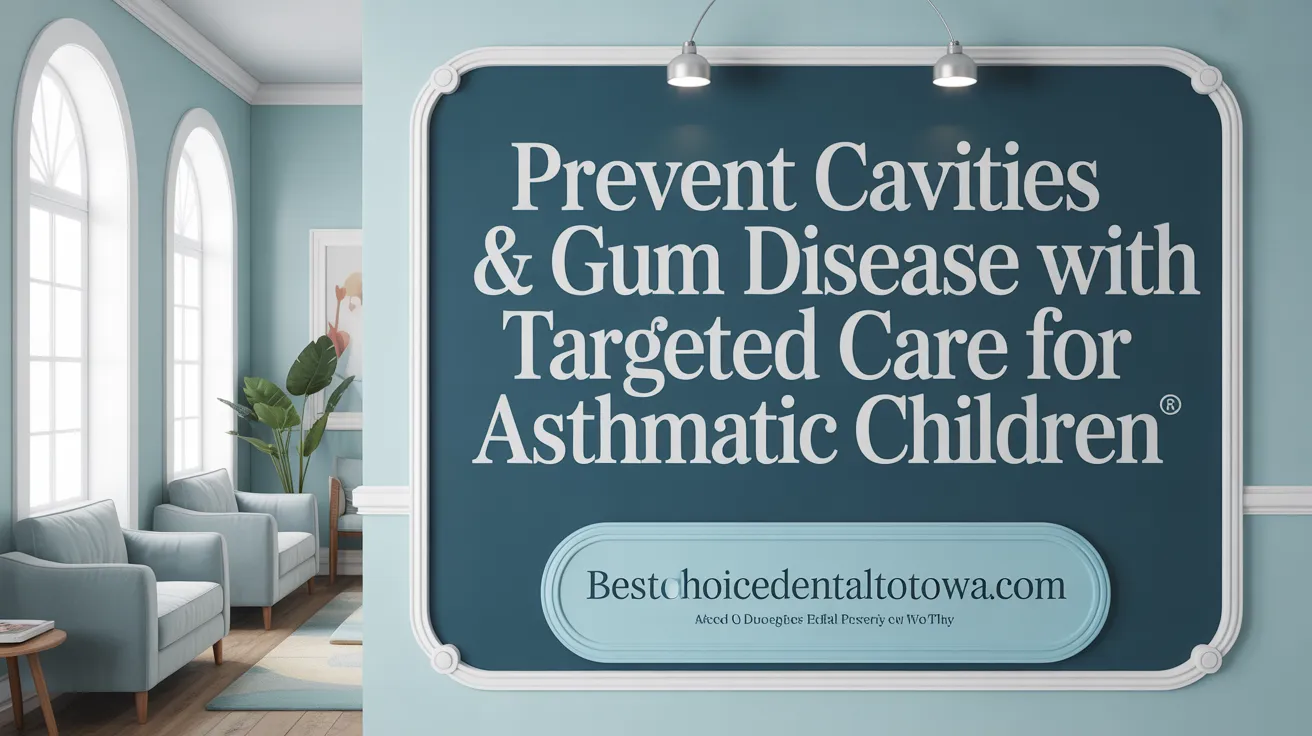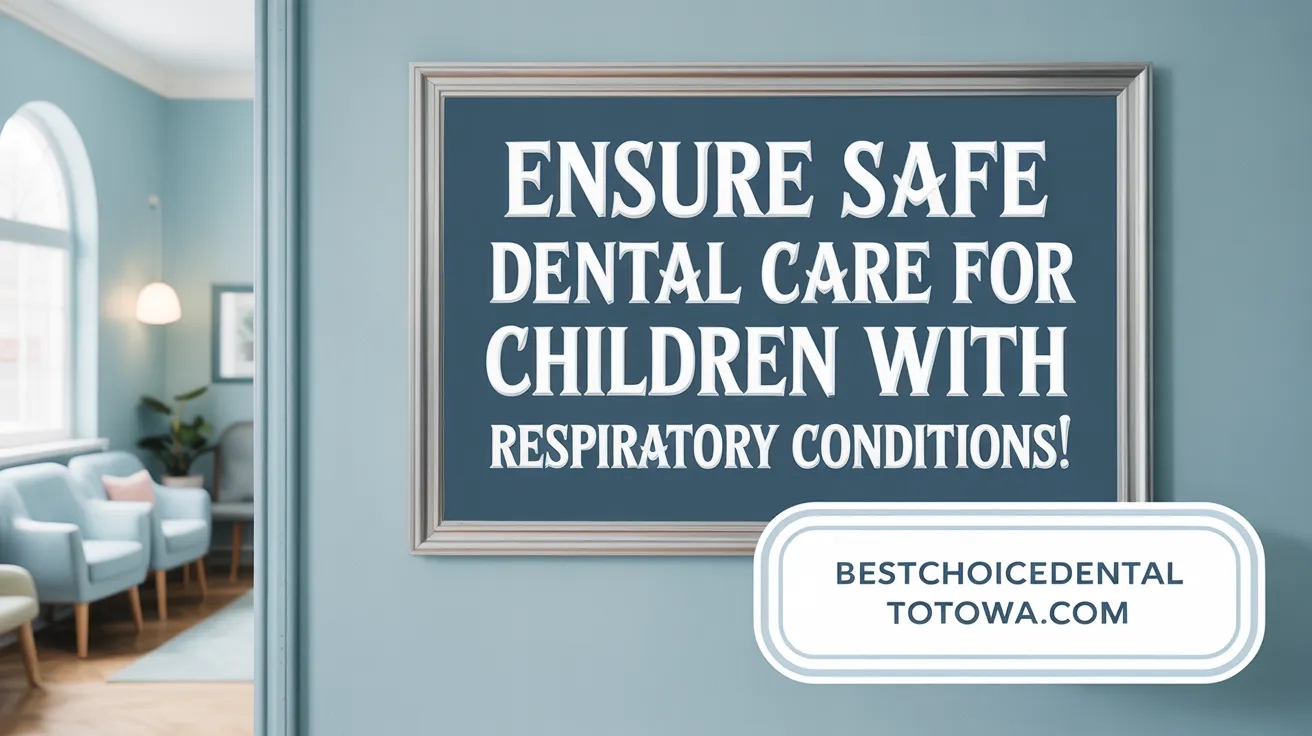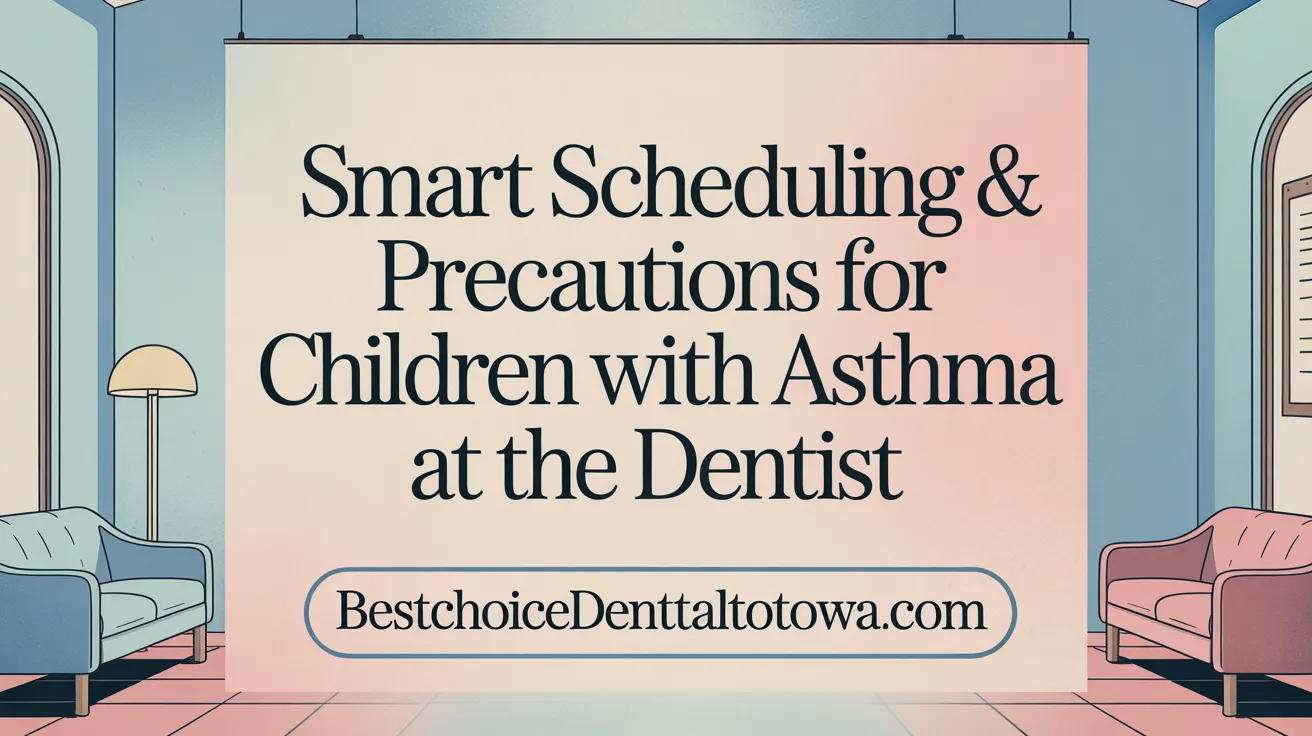Why Asthma and Oral Health Are Closely Linked
Asthma is a common respiratory condition affecting millions of children worldwide, but did you know it can also influence their oral health? Medications used to treat asthma, coupled with asthma-related symptoms, can increase the risk of cavities, gum disease, and oral infections in children. This article explores how asthma affects children's dental well-being, and offers practical advice for parents and caregivers to help keep young smiles healthy and cavity-free.
Understanding the Impact of Asthma on Children's Oral Health

How does asthma affect children's oral health?
Children with asthma often face greater challenges in maintaining good oral health. The condition itself, along with the medications used to manage it, can lead to several dental issues.
Inhaled medications, particularly corticosteroids, bronchodilators, and nebulized treatments, are commonly associated with side effects that harm oral health. These medications often cause dry mouth, reducing saliva flow which normally helps neutralize acids and wash away bacteria. Reduced saliva increases the risk of cavities and dental decay.
Furthermore, breathing through the mouth, a common trait in children with asthma, can lead to dryness of the mouth and throat, fostering an environment where bacteria and fungi may thrive. This can result in halitosis, increased plaque buildup, and higher likelihood of gum disease.
Common oral health issues in children with asthma
Children with asthma are more prone to oral problems such as increased plaque accumulation, gingivitis, and even cavities. The presence of dry mouth and altered oral pH levels contributes to the destruction of tooth enamel and bacterial growth.
Moreover, some children may develop oral candidiasis or thrush due to the use of inhaled steroids, which can suppress immune responses locally.
Physical features related to asthma that may affect oral health
Physical changes sometimes observed in children with uncontrolled asthma include increased facial height, a high palate, and a higher incidence of posterior cross bites. These features can make oral hygiene routines more difficult and may require specialized dental care.
Increased risk of cavities, dry mouth, and gum disease
The combination of medication side effects, mouth breathing, and physical oral features elevates the risk of several dental conditions. Dry mouth diminishes natural cleaning mechanisms, increasing cavity risk.
Children with asthma also face higher risks of developing gum inflammation and periodontal disease, especially if their asthma is poorly controlled or if they do not maintain proper oral hygiene.
Preventive dental care for children with asthma
Effective management involves rinsing the mouth with water after inhaler use, applying fluoride treatments, and scheduling regular dental visits. Dentists may recommend additional measures like dental sealants or fluoride varnish applications to further protect enamel.
Overall, awareness and proactive dental care are vital in helping children with asthma maintain healthy teeth and gums, decreasing the likelihood of dental infections and ensuring overall well-being.
Preventive Measures to Maintain Dental Health in Children with Asthma
 Children with asthma face unique challenges when it comes to maintaining healthy teeth and gums. The medications used to control their asthma, especially inhaled steroids and bronchodilators, can cause dry mouth and increase the risk of cavities and oral infections like thrush.
Children with asthma face unique challenges when it comes to maintaining healthy teeth and gums. The medications used to control their asthma, especially inhaled steroids and bronchodilators, can cause dry mouth and increase the risk of cavities and oral infections like thrush.
To keep their mouths healthy, parents should focus on consistent and targeted oral hygiene practices. Brushing twice daily with a soft-bristled toothbrush and fluoride toothpaste helps remove plaque and bacteria. It’s important to supervise children under 6 and help them until they develop good brushing skills.
Rinsing the mouth with water after using inhalers is a simple yet effective step to wash away residual medication and reduce the risk of bacteria buildup. For children prone to dry mouth, staying well-hydrated by drinking fluoridated tap water helps maintain saliva flow, which is vital for neutralizing acids and remineralizing teeth.
In addition to good hygiene habits, regular dental visits—ideally every six months—are crucial. Dentists can detect early signs of decay, apply fluoride varnish to strengthen teeth, and discuss the use of dental sealants to protect chewing surfaces. These sealants can prevent around 80% of cavities in back teeth.
Diet also plays a role in cavity prevention. Limiting sugary snacks, drinks, and juices reduces the sugar supply that bacteria feed on, decreasing acid attacks on enamel. Healthy eating habits, combined with proper oral care, form the foundation of effective dental health management for children with asthma.
Collaborating with healthcare providers is equally important. During dental visits, families should inform the dentist about the child’s asthma control, medications, and any recent changes. Bringing inhalers to appointments and preparing for potential asthma attacks ensures a safe environment.
In summary, maintaining oral health in children with asthma involves diligent daily hygiene, use of fluoride treatments, hydration, dietary control, and regular professional care. These measures collectively help prevent cavities, gum disease, and other oral infections, supporting overall well-being.
Practical Dental Hygiene Tips for Children with Respiratory Issues

What are effective dental hygiene practices for children with respiratory issues like asthma?
Children with asthma require special attention to their oral health due to the side effects of their medications, such as dry mouth and increased cavity risk. Effective practices include brushing their teeth twice daily using a soft-bristled toothbrush and fluoride toothpaste, which helps rebuild enamel and prevent decay.
Supervised brushing is important until children develop good skills, generally around age 7 or 8. For younger children, parents should assist to ensure proper technique and the correct amount of toothpaste—only a tiny smear until age 3 and a pea-sized amount from age 3 onward.
Since inhalers can cause mouth dryness, rinsing with water after inhaler use is recommended to wash away residual medication and reduce bacteria growth. Using inhalers with spacers minimizes the medication's contact with teeth, further protecting against decay.
Regular dental checkups, ideally every six months, help detect early signs of problems such as dental erosion, cavities, or gum inflammation. Dentists may recommend additional preventive measures like fluoride varnish applications or sealants.
Children with asthma should also avoid inhalers containing acidic or sugary components when possible, as these can erode enamel or promote cavities. Managing asthma effectively and reducing stress during dental visits can also improve overall oral health.
Close collaboration between healthcare providers and dental professionals is essential. Monitoring for allergic reactions to dental materials and adjusting care plans ensure that children’s specific respiratory and oral health needs are met.
In summary, attentive oral hygiene, proper use of inhalers, routine dental visits, and preventive strategies are vital for maintaining good dental health in children with respiratory conditions.
Managing Dental Visits and Care for Children with Asthma

What recommendations exist for managing dental visits and care in children with asthma?
Children with asthma require special attention during dental care to prevent triggering symptoms and ensure safe treatment. It is recommended to schedule dental appointments during periods when the child's asthma is well-controlled. This helps reduce the risk of an asthma attack triggered by dental procedures.
Parents and caregivers should inform the dental team about the child's asthma status, including the severity of the condition, current medications, and any known triggers. This information allows the dental team to prepare appropriately and consider necessary precautions.
Preparing emergency medications, such as bronchodilators or inhalers, to be easily accessible during visits is essential. For children with severe or poorly controlled asthma, pre-treatment with a bronchodilator may be advised to minimize the risk of symptoms.
During dental procedures, continuous monitoring for signs of respiratory distress is important. Providing supplemental oxygen if needed and avoiding known triggers—such as certain dental materials or fumes—can help maintain safety.
Good communication between the dental professional and the child’s medical team is vital. It ensures that dental care is coordinated with asthma management and that any necessary adjustments are made.
Maintaining thorough oral hygiene, using fluoride treatments, and encouraging rinsing with water after inhaler use can lower the risk of cavities, gum disease, and fungal infections related to dry mouth or medication side effects.
In summary, a well-coordinated approach with attention to the child's asthma control, medications, and triggers ensures safe and effective dental care for children with asthma.
Promoting Oral Health Awareness for Children with Asthma

What strategies can promote overall oral health awareness in children, especially those with asthma?
Raising awareness about oral health in children with asthma involves a combination of education, coordination, and proactive prevention. Parents, caregivers, and children should receive guidance on good oral hygiene habits, such as rinsing with water after inhaler use, which helps remove residual medication and prevent dry mouth. Applying fluoride treatments and avoiding sugary snacks and drinks are also crucial steps to strengthen teeth and reduce decay risk.
Educational programs in schools and caregiver guidance sessions can emphasize the importance of early and regular dental visits. Dentists should ask about asthma control, medications, and possible triggers during checkups. Working in tandem with medical professionals ensures that children receive appropriate preventive measures—like fluoride varnish applications—that are safe and effective.
Addressing behavioral factors that cause dental anxiety can encourage children to attend routine visits without fear. Techniques such as familiarization visits, positive reinforcement, and comfort measures help children cooperate and accept dental care.
A holistic approach also involves lifestyle adjustments, such as ensuring a healthy diet, avoiding secondhand smoke, and managing asthma symptoms effectively. Incorporating these steps enhances overall health and prevents oral complications that are common among children with asthma.
By combining education, preventive care, behavioral support, and interdisciplinary collaboration, families and health providers can significantly improve oral health outcomes for children with asthma, fostering lifelong good habits and reducing dental disease risk.
Ensuring Bright Smiles for Children with Asthma
Children with asthma face unique challenges that can impact their oral health, but with informed care and preventive strategies, parents and caregivers can make a significant difference. Establishing a daily routine of proper dental hygiene, staying vigilant about the effects of asthma medications, and maintaining regular dental visits all contribute to safeguarding children's teeth. Collaborative efforts between dental professionals, healthcare providers, and families are key to addressing the specific needs of asthmatic children. By promoting awareness and early intervention, we can help ensure that every child enjoys a healthy, vibrant smile despite the challenges of asthma.
References
- Oral Health Tips for Children
- Dental Health in Children with Asthma
- Good Oral Health Starts Early: AAP Policy Explained
- Oral Health
- Parents - Texas Department of State Health Services (DSHS)
- A Parent's Guide to Dental Care for Children with Asthma - lsusd
- Keeping Your Child's Teeth Healthy
- Toddlers (age 1-4)
